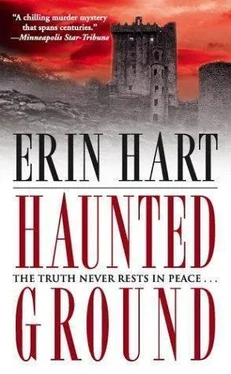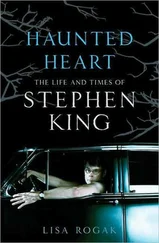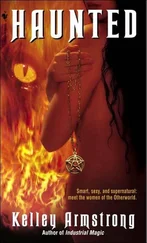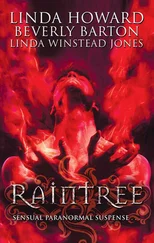Erin Hart
HAUNTED GROUND
A Novel
One crow, sorrow.
Two crows, mirth.
Three crows, a wedding.
Four crows, birth.
Five crows, wealth.
Six crows, strife.
Seven crows, travel.
Eight, a troubled life.
—Traditional counting rhyme
Creacht do dhail me im arthach galair.
A fateful wound hath made me a hulk of sadness.
—Irish poet Daibhi O Bruadair, 1652
With a sodden rasp, Brendan McGann’s turf spade sliced into the bank of earth below his feet. Had he known all that he’d turn up with the winter’s fuel, perhaps he would have stopped that moment, climbed up onto the bank, and filled his shed with the uniform sods of extruded turf that a person could order nowadays by the lorry-load.
But Brendan continued, loosening each sopping black brick with the square-bladed turf spade, tossing it over the bank, where it landed with a plump slap. He performed his task with a grace and facility that comes from repeating the same motion times without number. Though his father and grandfather and generations before had taken their turf from this same patch of bog, Brendan never thought of himself as carrying on an age-old tradition, any more than he considered the life cycles of all the ancient, primitive plants whose resting place he now disturbed. This annual chore was the only way he’d ever known to stave off the bitter cold that crept under his door each November.
Chilblains were the farthest thing from Brendan’s mind this unusually sun-drenched late-April morning. A steady westerly breeze swept over the bog, chasing high clouds across the watery blue of the sky, and teasing the moisture from the turf. Good drying today, his father would have said. Brendan worked in his shirtsleeves; his wool jacket, elbows permanently jointed from constant wearing, lay on the bank above his head. He paused, balancing his left arm on the handle of the upright slean, and, with one rolled-up sleeve, mopped the sweat from his forehead, pushing away the damp, dark hair that stuck there. The skin on his face and forearms was beginning to feel the first pleasant tightness of a sunburn. Hunger was strong upon him at the moment, but just beyond it was an equally hollow feeling of anxiety. This might be the last year he could cut turf on his own land without interference. The thought of it burned in the pit of his stomach. As he clambered up the bank to fetch the handkerchief from his coat pocket, he searched the horizon for a bicycle.
Forty yards away, his younger brother Fintan made a comic figure as he struggled against the weight of a turf-laden wheelbarrow. Fintan dumped his two dozen wet sods at the end of a long row, one of many that lent the surface of the bog the temporary texture of corduroy. For a good square mile around them, little huts of footed turf covered the landscape. Here and there on the neighbors’ allotments, large white plastic bags bulged with sods dried as hard as dung.
“Any sign of her yet?” Brendan shouted to his brother, who raised his shoulders in a shrug and kept at his work. The two men had been hard at it since nine, with only a short tea break midmorning. Their sister Una was to bring them sandwiches and tea, and pitch in with footing the turf. It was cumbersome, backbreaking work, turning the sods by hand so that they dried in the sun. It would be another month before this lot could be drawn home.
Tucking his handkerchief in his back pocket, Brendan descended once more into his gravelike void, noting with a small grimace of satisfaction the angled pattern his slean had made down the wall of the bank. He was reaching the good black turf now, more appreciated in these parts for its long-burning density than for the fact that it had remained in this place, undisturbed and undecayed, for perhaps eight thousand years.
He set to work again, trying to drown out the rumbling in his belly by concentrating on the sound and the rhythm of cutting. He was used to hard physical labor, but there was no doubt about it, something in the bog air put a fierce hunger on a man. What might the day’s lunch be? Chicken sandwiches, or egg, or perhaps a bit of salty red bacon on a slab of brown bread. Each stroke became a wolfish bite, a slug of hot sweet tea to wash it down. One more row, he thought, heaving each successive sod with more violence, just one more row—and then his blade stopped dead.
“Shite!”
Fintan’s head poked into view at the edge of the cutaway. “What’s the matter? Strike a bit of Noah’s ark down there?”
“Ah, no,” Brendan said. “Only a bit of horsehair.”
There were four things, their father always said, that could stop a man cutting turf. Brendan could hear the old man’s voice: Wig, water, blocks, and horsehair. Then he’d hold up four fingers in front of their faces. Meet any of them, boys, and it’s your Waterloo.
“Hand us down the spade, will yeh?”
Fintan obliged, then leaned on the handle of his fork to watch. Though these things typically turned out to be tree trunks and roots, other wonders turned up in bogs occasionally—rough beams of oak, ancient oxcarts, wheels of cheese or wooden tubs of butter. Stores buried for keeping in cool wetness and long since forgotten—objects caught and suspended outside of time by the watery, airless, preserving power of the bog.
Working deliberately, Brendan dug around the perimeter of the fibrous mat, probing for its edges, and scraping away loose bits of peat. He knelt on the spongy bank and pulled at the strands that began to emerge from the soaking turf. This was not horsehair; it was tangled and matted, all right, but it was too long, and far too fine to be the rooty material his father called horsehair. Brendan worked his broad fingers into the dense black peat he’d pried loose with the spade. Without warning, a block in his left hand gave way, and he cast it aside.
“Holy Christ,” Fintan whispered, and Brendan looked down. Almost touching his knee were the unmistakable and delicate curves of a human ear. It was stained a dark tobacco brown, and though the face was not visible, something in the line of the jaw, and the dripping tangle of fine hair above it, told him at once that this ear belonged to a woman. Brendan struggled to his feet, only dimly aware of the cold water that was seeping through the knees of his trousers and down into his wellingtons.
“Sorry, lads. You must be perished with the hunger.” Una’s breathless apology carried toward them on a bit of breeze. “But you should have seen me. I was literally up to my elbows…” Her voice trailed off when she saw the faces her brothers turned toward her. Brendan watched her stained fingers tighten their grip on the flask, and on the sandwiches she’d wrapped hastily in paper, as Una stepped to the edge of the bank beside Fintan and looked down at their awful discovery.
“Ah, Jaysus, poor creature” was all that she could say.
Cormac Maguire was in the shower when the call came. He let it ring, as he customarily did, until the answerphone came on. But hearing the excitement in Peadar Wynne’s voice, he hastily wrapped himself in a towel and sprinted down the stairs, hoping to catch Peadar before he rang off. Cormac stood just over six feet and, though he’d begun to feel a few creaks during the passage of his thirty-ninth year, still possessed a rower’s lean, muscular frame. His dark brown hair was cut short; intense dark eyes, a long, straight nose, and a square jaw defined his angular face. His pale olive complexion would soak up sun as he spent time in the field during the summer months. He had neglected to shave for the past couple of days, and now water dripped at irregular intervals from his chin to his bare chest.
Читать дальше











